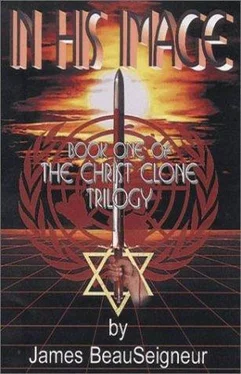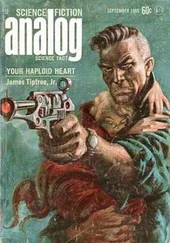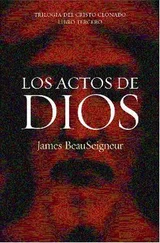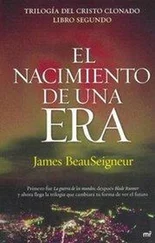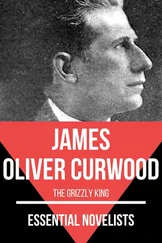Hansen was surprised that Kruszkegin had even taken his call; the straight answer was even more unexpected. Hansen knew the Russian well enough to have a pretty good idea when he was lying and when he was telling the truth. Right now he seemed to be telling the truth; at least as far as he knew the truth. "Thank you, Yuri," Hansen said. Kruszkegin's straightforward answer left little else to be said.
British Mission, New York (1:57 a.m.)
Ambassador Hansen's senior staff members watched the news reports on television as they awaited his arrival. "Does anyone know what's going on?" Hansen asked as he walked in the door just before 2:00 a.m. New York time.
"The Russians claim that they had nothing to do with it," began Jack Redmond, Hansen's legislative assistant. "They say that the attack was against the Russian troops in Israel's mountains."
This was a new twist on the story. "How the hell could that happen?" Hansen asked, incredulously. Redmond shook his head.
In the brief silence, Hansen's attention turned to the reporter on television. "There is speculation at the State Department," the reporter said, "that the attack on Israel could be the result of some internal power struggle inside the Russian government. The battle for power and control of policy has been heated, to say the least. Hard-liners like Foreign Minister Cherov and Defense Minister Khromchenkov want to lead Russia back to communism and world power, while others like President Perelyakin favor a more moderate approach. The Russian invasion of Israel still has many analysts unsure of who's in charge."
Jack Redmond shrugged his broad shoulders as Hansen looked at him for his comment. "It's possible," he said. "But it doesn't really answer the big questions. We know that no cities were hit; apparently the missiles fell in the wilderness areas of the country. That would seem to support Russia's assertion that it was their troops that were hit, but I can't imagine any kind of political situation so bad that one group of Russians would bomb another."
"Okay, let's assume for a moment that the Russians are telling the truth: that they're not responsible for the bombing," Hansen said. Which country with the capability to launch a nuclear attack would actually do it?"
No one had an answer.
"Mr. Ambassador," Decker interjected, "whoever launched the attack, the Israelis have apparently taken advantage of the confusion. There are reports of fighting between Russians and Israelis in every major city, and Israeli resistance fighters apparently have taken over all of the television and radio stations."
Hansen ran his hand over his head and thought for a second. "Is it possible," he asked, "that this whole thing could be the work of the Israelis?"
Tel Aviv (10:30 a.m. Israel, 3:30 a.m. New York)
Deep beneath the streets of Tel Aviv the mood was bright and hopeful. Phase one of the plan had been a complete success: the Russians had been totally unaware of the transfer of control from the Strategic Defense Control Facility to the Off-Site Facility; the evacuation of civilians had taken place with only a few slight delays; the Gideons had been launched (much to the surprise of Russian security teams guarding the missile silos); and all of the designated targets had been hit. It was now five hours since the launch.
In the streets of Israel, citizens were attacking the occupying Russians troops. In the mountains near Mizpe Ramon, an Israeli squadron had surprised the security force outside the Strategic Defense Control Facility, and was now preparing to wait out the surrender of those inside. It would be useless to try to force them out; the facility, with its three-foot thick steel walls and doors, was impervious to anything, with the possible exception of a direct hit by a multi-megaton nuclear warhead. When the Russians invaded four months earlier, those in control of the facility had surrendered it only after they were ordered to do so by the Israeli Defense Minister. Though the facility had been completely overridden by the Off-Site Facility and was therefore useless to the Russians, it would likely be a long wait before the occupants surrendered.
Any celebration would have to wait, however: phase two required the full attention of Colonel White and his team at the Off-Site Facility. While the Israelis would soon be able to secure the weaponry warehoused at the Russian camps, those in Colonel White's team had the immediate responsibility of directing Israel's strategic defense against a possible retaliatory nuclear strike from the Russians.
Scott Rosen estimated that Israel's strategic defense could eliminate ninety-seven percent or more of anything the Russians might send at them in a full scale attack. The throw-weight of the Russian nuclear arsenal had been substantially reduced since the collapse of the Soviet Union, but a full scale attack would still mean that several soft targets – that is, cities – could be hit. If the attack were of a lesser scale – a "limited" response – the strategic defense could probably destroy all incoming warheads. The most likely scenario was that the Russians would choose a strong but limited response in order to reduce the possibility of a response from the West. What everyone hoped for, however, was that the Russians – realizing that Israel was once again in control of its own strategic defense – would see that a nuclear attack would ultimately prove futile, and therefore they would not launch at all. There was no way to be certain how the Russians would respond and each person in Colonel White's team understood that every warhead that got through meant the deaths of tens of thousands of their countrymen.
This was not a game of siting targets and pulling triggers; the strategic defense was fully automated. It had to be. Destroying the maximum number of approaching missiles required a nearly instantaneous response to launch. There was no room for 'man-in-the-loop.' Once the order was given to place the Battle Management/Command, Control and Communications (BM/C3) computers on 'threat' status, the role of humans was reduced to support and repair. Some argued that it was dangerous to turn the control of the system over to the system itself, but as Joshua Rosen and his colleagues had successfully countered, it was the best way to ensure survival.
The strategic defense was now initiated for immediate response to any sign of launch from Russia, her allies, or from the sea.
The Hand of God
The Kremlin, Moscow
Eleven hundred miles and nearly due north of Tel Aviv, the Russian Security Council was meeting to discuss the events in Israel. It was now 4:00 a.m. in New York, and 11:00 a.m. in Moscow, which shares the same time zone as Israel.
At 86 years old, Defense Minister Vladimir Leon Josef Khromchenkov was the oldest of the thirteen men assembled in the Kremlin's war-room. Khromchenkov was born in 1917, sometime during the night of November 6-7, the same night that the Bolsheviks had seized power. His father had missed the birth, choosing instead to take part in the fighting in Petrograd. Throughout the revolution and the years that followed, Khromchenkov's father somehow managed to walk the fine line of being close to Lenin, Stalin, and Trotsky and yet was never so close to any one of them that he was considered a threat by the other two. His ability to maneuver through politically treacherous waters had been passed on to his son. After serving for nearly forty years in the Soviet Army, Vladimir Khromchenkov first came to the Kremlin during the early days of Gorbachev as a candidate of the hard-liners who opposed Gorbachev's reforms and were afraid he might 'give away the store.'
Boris Yeltzin had made several attempts to weaken Khromchenkov's political power and even to remove him from the Security Council, but without success. Khromchenkov knew the inner workings of everything and used this to his advantage. Had he wanted it, he might well have become President, but Khromchenkov preferred manipulating to being manipulated. It was said of Khromchenkov that he believed that just as he had been born on the night the revolution began, it was his destiny not to die until the Soviet Union had been restored as a world power. And though he gave the credit to others, it was Khromchenkov who had engineered the invasion of Israel as a key step toward bringing about that destiny.
Читать дальше
